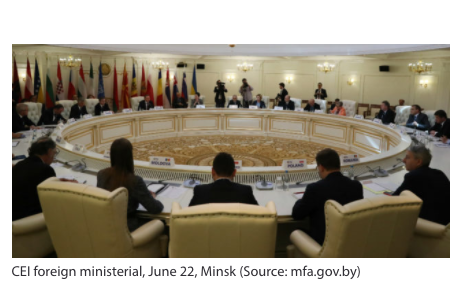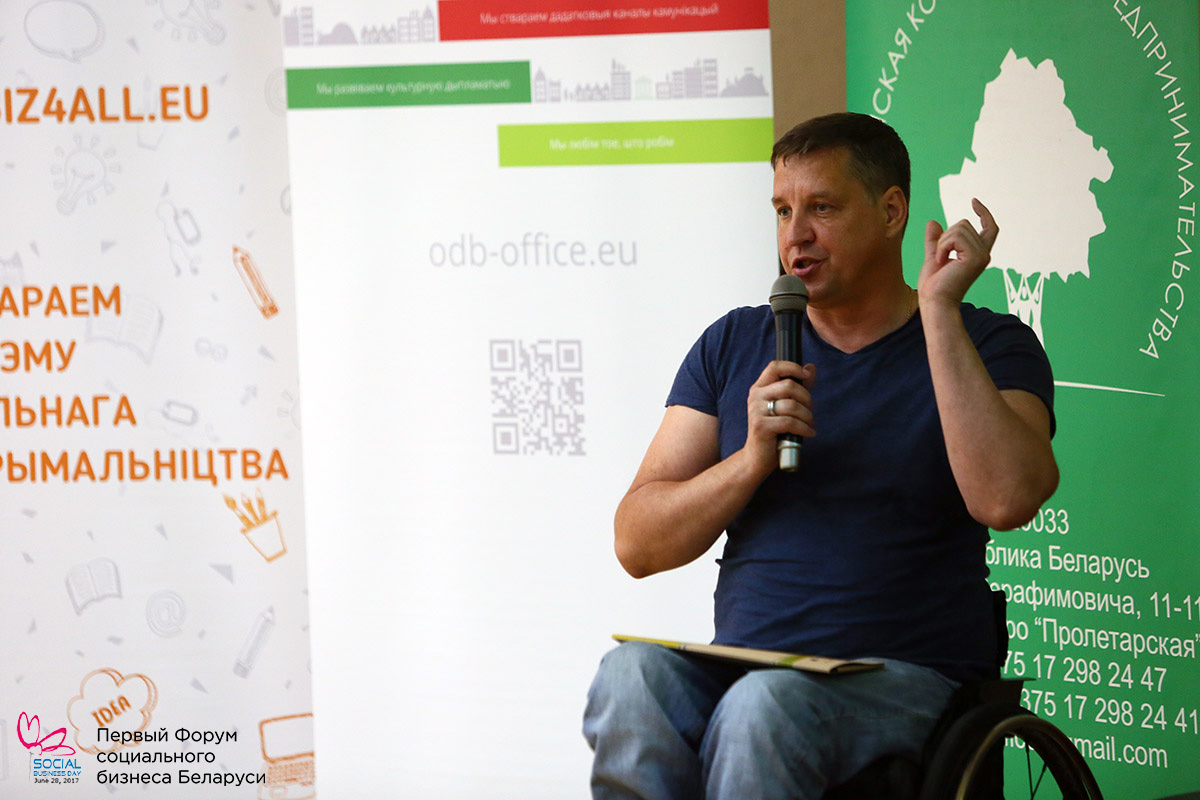

In July, analysts at the Ostrogorski Centre discussed arms deals between Belarus and Russia, developments in Belarusian-Ukrainian relations and the smear campaign against Svetlana Alexievich in the Russian media. We also uploaded video recordings of the Ostrogorski Forum 2017 – a conference on Belarus-EU relations, security, and identity that took place in Minsk in June. […]

On 21 July 2017, Alexander Lukashenka visited Kyiv and met with Ukrainian president Petro Poroshenko. After the meeting, Poroshenko stated that he had received guarantees of security and that Ukraine would never be threatened from Belarusian territory. However, the very same day, Ukrainian Minister of Defence Stepan Poltorak voiced a different view: ‘Ukraine and the […]

On 1 July, on the eve of the official Independence day, Alexander Lukashenka highlighted a relation of Belarusians to the Great Duchy of Lithuania. It became the first statement of officials that identifies Belarusians with an independent discourse of statehood. Since the Ukrainian conflict, Belarusian authorities started displaying the rhetoric that significantly differs from the traditional official discourse of nationhood. Using independent and pro-Belarusian statements, Belarusian authorities continue balancing between West and East aiming as well to decrease the internal confrontation with the opposition.

On 15 – 16 July 2017, Minsk hosted the VII Congress of the Belarusians of the World, gathering over 300 participants. This year's event was remarkably diverse, featuring Belarusian foreign minister Uladzimir Makei and even the former detainees in the White Legion case.

Belarusian President Alexander Lukashenka travelled to Kyiv on an official visit on 20-21 July. Both Belarus and Ukraine, for different reasons, are seeking to reinvigorate direct dialogue between their leaders, which they resumed three months ago in the Chernobyl zone. The ‘age-old friendship’ (in Lukashenka’s terms) between Alexander Lukashenka and Petro Poroshenko may appear paradoxical: the former is authoritarian and pro-Russian while the latter is democratically minded and pro-European. Ukraine is resisting Russian aggression while Belarus remains Moscow’s closest military and political ally. It seems that simplistic political clichés do not capture the two nations' complex relationship.

The Belarusian state press promotes the new Helsinki process initiated on Minsk's initiative and reports on the numerous foreign policy achievements of the country. The government attempts to engage the Belarusian Diaspora worldwide to realise its goals. Belarusian exports demonstrate growth after a long recession. This and more in the new edition of the Belarus State Press Digest.

On 18-19 July, Belarus officially welcomed a delegation of European parliament, and Latvian foreign minister, who made rather positive statements on Minsk's policies. These developments continued the process of Belarus' rapprochement with the EU and other Western structures. A milestone in this process became the annual session of the OSCE Parliamentary Assembly in Minsk on 5-7 July. Later, president Lukashenka commented that even three years ago he he could not imagine a session of OSCE Parliamentary Assembly being hold in Minsk. Belarusian government is finally reaping the fruits of its labour in pursuing neutral policies between Russia and its opponents. That causes reaction of Russian political establishment yet Minsk so far succeeded in minimising that.

On 12 July 2017, a Maladzečna District court tried two teachers for the death of 13-year old high school student Viktoryja Papčenia. Viktoryja died tragically last September under the wheels of a truck while harvesting potatoes for a local agricultural enterprise. School No. 11 had sent Viktoryja and her classmates to work in the field without parental consent. The practise of sending students to state agricultural enterprises to work for free during harvest time has its roots in Soviet times. This phenomenon still remains common in modern Belarus, and most Belarusians do not see it as a form of forced labour.

The Belarusian government’s crackdown on peaceful protests in early spring failed to markedly affect its contacts with the West. In June-July, the intensity of Belarus’s diplomatic dialogue with Europe was probably at its highest point in the last several years. However, Western leaders are still in no hurry to negotiate directly with President Lukashenka. The authorities took advantage of the high-level meetings of the CEI and the OSCE Parliamentary Assembly in Minsk to promote their vision of Belarus as a responsible international player and regional mediator. It remains to be seen whether this strategy will discourage the West from focusing on issues of democracy.

CET releases analysis of the sector of Belarusian human rights organisations. Arseni Sivitsky dissects reasons for Belarus’ heavy rearmament with Russian help. Grigory Ioffe analyzes Svetlana Aleksievich’s public speaking. Economist Irina Tochitskaya: Belarus falls in a slow growth trap. Belarus in Focus: Minsk steps back to international and public pressure over the White Legion case. Natalia Ryabova sums up key trends for Belarusian independent think tanks. Liberal Club presents a study on how to stimulate the development of philanthropy and CSR in Belarus. Economist Dmitri Kruk believes that Belarus is ten years behind without reforms.

Every year on 3 July in Minsk, Belarus traditionally conducts a military parade devoted to the official Independence Day. This year, however, the military parade triggered widespread discussions in the media. Just before the most recent parade, more than 9,000 Belarusians signed a petition against military parades in the capital. However, many Belarusians still view the tradition in a positive light. These massive military parades are inconvenient for citizens and require serious financial expenditures. Instead of putting on a costly show, Belarus could invest the money in the development of its army or infrastructure.

Belarus's neighbours regularly voice their concerns about Minsk's role in a potential Russian invasion of the Baltic states or Ukraine. However, on 15 June, Belarusian president Alexander Lukashenka insisted that although Belarusian and Russian troops were operating in the region 'as one,' they had no aggressive intentions. Just a cursory glance at the Belarusian army raises doubts about its ability to engage in any large offensive operations. To make up for its diminishing national army capacities, the Belarusian government went as far as to bring the emergency ministry's aviation to the 3 July Independence Day parade, along with equipment from the DOSAAF, a paramilitary sport association. In addition, the government invited a large number of Russian military aircraft and helicopters to airshows in Minsk and Mashulishchy, a town nearby.

On 19 June, the Russian information agency Regnum published a widely discussed interview with Sviatlana Alieksijevič, the 2015 Nobel Prize Winner from Belarus. Despite the fact that Alieksijevič forbade Regnum to publish the interview, the news outlet went ahead and released the article. In a conversation with journalist Sergei Gurkin, Alieksijevič touched upon the issues of Russification in Belarus, the war in Ukraine, and the status of the Belarusian and Ukrainian languages. The interview led to widespread discussion of Alieksijevič in Russia, Belarus, and Ukraine.

SYMPA/BIPART invite to an anti-corruption party. ECLAB opens student enrolment for the 2017-2018 academic year. First Social Business Forum takes place in Belarus. Civil Society Parallel Forum is held in Minsk ahead of the 26 annual OSCE PA session. Human rights defender becomes member of the government’s penitentiary system monitoring commission. New gender project helps Belarusian women tell their stories. All defendants in the White Legion case are released. Ministry of Economy agrees with Perspektyva’s proposals. This and more in the new edition of the Belarus civil society digest.
